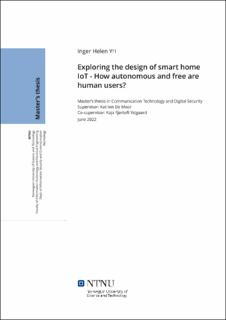| dc.description.abstract | Mennesker sin hverdag involverer i økende grad interaksjon med intelligent teknologi. I løpet av de siste par årene har menneskets mest private rom, nemlig hjemmene deres, stadig blitt mer tekniske gjennom den raske utviklingen av tingenes internett (IoT) for smarthjem. Derfor blir det avgjørende at disse enhetene først og fremst er utformet med menneskets autonomi og handlefrihet (agency) i tankene for å sikre menneskelig velvære, kontroll og sikkerhet. Som et bidrag til pågående forskning på dette feltet, sikter denne oppgaven på å vurdere om det eksisterer en tidlig indikasjon på hvor og hvordan ulike aktører, som inkluderer direktiv, myndighetene, industri og akademikere, i smarthusutvikling har autonomi og menneskelig handlefrihet på deres dagsorden. Først tar denne oppgaven et dypdykk i aktørenes synspunkter. Deretter hjelper kartlegging av de opplevde konsekvensene og brukstilfellene å identifisere hvor balansen mellom menneskelig autonomi og enhet/teknologi autonomi må vurderes nøye for å sikre menneskelig velvære i smarthjem. For å oppnå dette målet er brukernes behov og ønsker i smarthjem kontekst undersøkt gjennom en litteraturgjennomgang, sammen med hvordan aktørenes perspektiv er illustrert i litteraturen. Deretter ble det gjennomført semistrukturerte intervjuer (N=9) med ekspertaktørene for å undersøke hvor de står i dag for å beskytte menneskelig autonomi og handlefrihet.
Hovedfunnene fra denne oppgaven illustrerer at fokuset på menneskelig autonomi i en teknisk kontekst er i en tidlig fase. Oppfatningene blant de ulike aktørene varierer med hensyn til tolkningen av hva begrepet autonomi betyr i en teknisk sammenheng, og følgelig omfanget av å ha beskyttelse av autonomi på dagsorden. For å finne en teknisk løsning, burde konsensus om hvordan man tolker autonomi teknisk videreutvikles. Denne studien har identifisert fire konsekvenser, nemlig manipulasjon og profilering, mulige tilgjengelige helsedata, redusert personvern og ubalanse i maktforhold. For å minimere disse konsekvensene kan mer fokus på å gi forbrukerne lett forståelig informasjon og pedagogisk bevissthet knyttet til teknologibruk være forebyggende tiltak. Videre vil det å bygge meningsfull beskyttelse for menneskelig autonomi tidlig og konsekvent inn i den tekniske utviklingsprosessen forbedre hvordan man operasjonaliserer konseptet. Ettersom dette emnet er i et tidlig persepsjonsstadium blant alle intervjuede aktører, vil fremtidig forskning være nødvendig for å utvikle et teknisk rammeverk som sikrer autonomi for smarthusbrukere. | |
| dc.description.abstract | Humans every day lives increasingly involve interaction with intelligent technology. In the last couple of years, humans' most private spaces, namely their homes, have steadily become more technical through the rapid evolution of the smart home Internet of Things. Therefore, it becomes crucial that these devices are designed first and foremost with humans' autonomy and agency in mind to ensure human well-being, control, and safety. As a contribution to ongoing research in this field, this thesis aims to assess if there is an early indication of where and how multi-stakeholder actors, which include policy, government, industry, and academics, in smart home development have autonomy and human agency on their agenda. First, this thesis deep-dives into expert actors' point-of-view. Then, mapping the perceived consequences and use cases, helps identify where the balance between human autonomy and device/technology autonomy needs to be carefully considered to ensure human well-being in smart homes. In order to achieve this goal, users' needs and desires in a smart home context are investigated through a literature review, along with how the expert actors' perspective is illustrated in the literature. Then semi-structured interviews (N=9) with the expert actors were conducted to investigate where we stand today to protect human autonomy and agency.
The main findings from this thesis illustrate that the focus on human autonomy in a technical context is in an early stage. The perceptions among the multi-stakeholder actors vary regarding the interpretation of what the term autonomy means technically and, consequently the extent of having protection of autonomy on the agenda. In order to find a technical solution, consensus on how to interpret autonomy technically can be further developed. This study has identified four consequences, namely manipulation and profiling, possibly accessible health data, decreased privacy, and power relation dis-balance. To minimise these consequences more focus on giving consumers easily understandable information and educational awareness related to technology use can be preventative measures. Furthermore, building meaningful protections for human autonomy early and consistently during the technical development process would greatly improve how to operationalize the concept. However, as this topic is in the early perception stage among all the actors interviewed, future research will be necessary to develop a technical framework that ensures autonomy for smart home users. | |
